Further Vibration Abatement For The Cary Audio CD 306 Pro Version SACD Player

DarqueKnight
Posts: 6,765
Introduction
Since I already had my Dynamat Xtreme and tools out (after applying Dynamat to my power amps), I thought it was a good time to stick a little of the old "black magic" into my Cary Audio CD 306 Professional Version SACD player in order to deal with internal vibrations caused by the transport. I had already implemented an effective regimen against external vibrations as shown in figure 1.
Cary Audio did pay due regard to vibration abatement. The chassis is a thick aluminum box with copper bar bracing and thick aluminum cone feet. A thick aluminum plate covers the transport assembly and the disc tray is a single piece of machined aluminum. All circuit boards are braced well-supported to diminish vibration. However, Cary got it all wrong with the placement of the cone feet. Rather than a foot at each corner, there should have been a foot under the transport motor, another foot under the power supply, and a third foot in the rear opposite the foot under power supply. Cary's oversight actually worked out for the best. The Black Diamond Racing carbon fiber cone/pit system is a better solution than aluminum cones and I did not have the issue of permanently attached cone housings being in the way of the optimum placement locations.
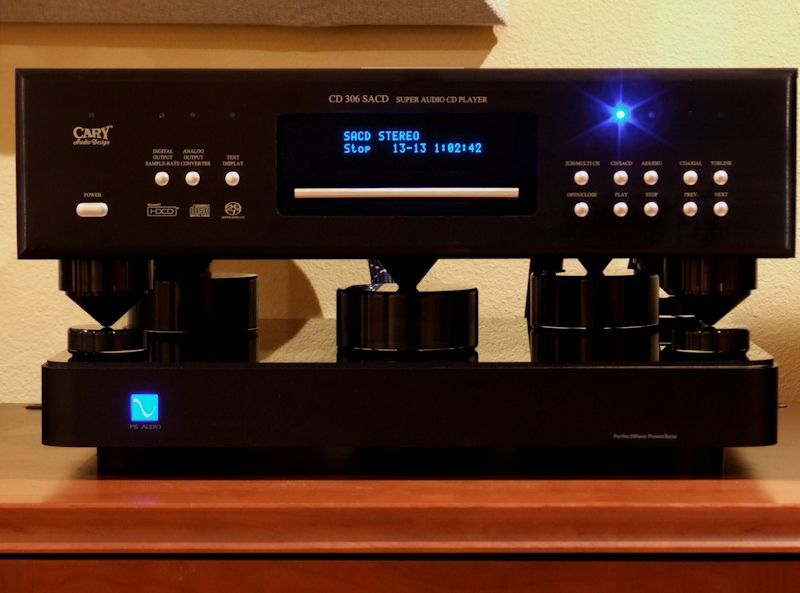
Figure 1. Cary CD 306 Pro Version SACD player resting on Black Diamond Racing Mark 4 cones and Jumbo
Pits, and a PS Audio PowerBase isolation platform with power line filtration.
Installation Procedure
Dynamat was applied to the transport cover, which is a thick 7/16" slab of aluminum, with an additional 1" thick aluminum bar over the disc spindle. The transport cover was fairly resistant to ringing, only producing a dull truncated ring when tapped. After Dynamat was applied, the transport cover produced a dull "thump" sound similar to that of a thick hardcover book when tapped with a finger.
Dynamat was also applied to the sides and rear of the plastic transport housing, the plastic crossbar which houses the spindle cap, and the sides of the copper walls on either side of the transport..
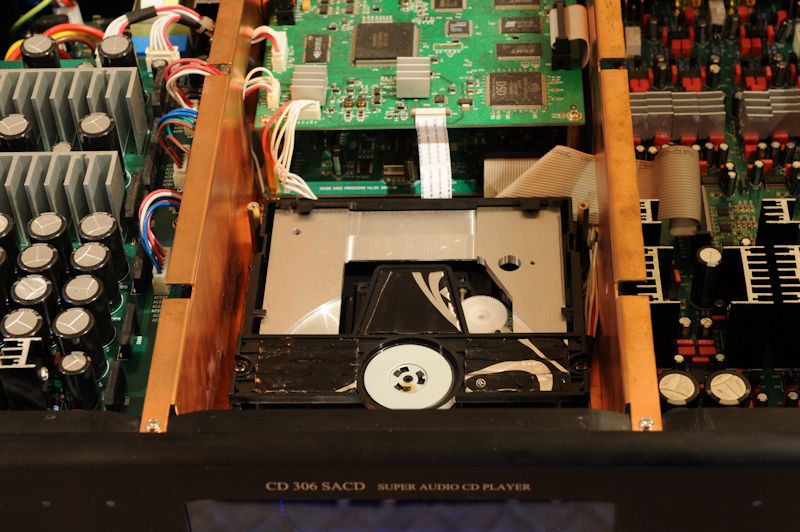
Figure 2. Tight space! The disc tray is aluminum, but the transport housing is all plastic. There was only
1/4" clearance between the sides of the transport and the copper walls. I used a tool to assist in applying
Dynamat in those narrow spaces.
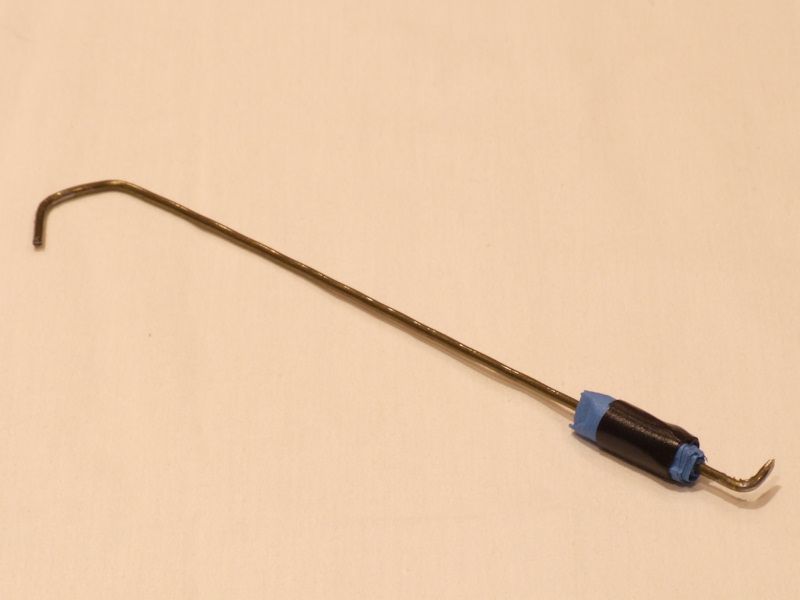
Figure 3. This thingamajig, which was made from a wire clothes hanger to assist in pulling drivers from a
speaker cabinet, has proven useful in lifting off the snug-fitting covers of my X600.5 power amps and in
spreading strips of Dynamat in tight places.
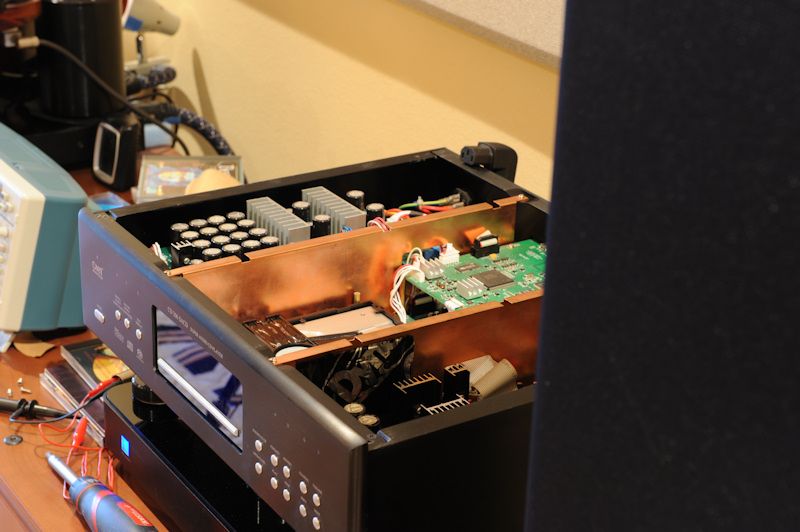
Figure 4. Dynamat was applied to the opposite sides of the copper walls adjacent to the transport.
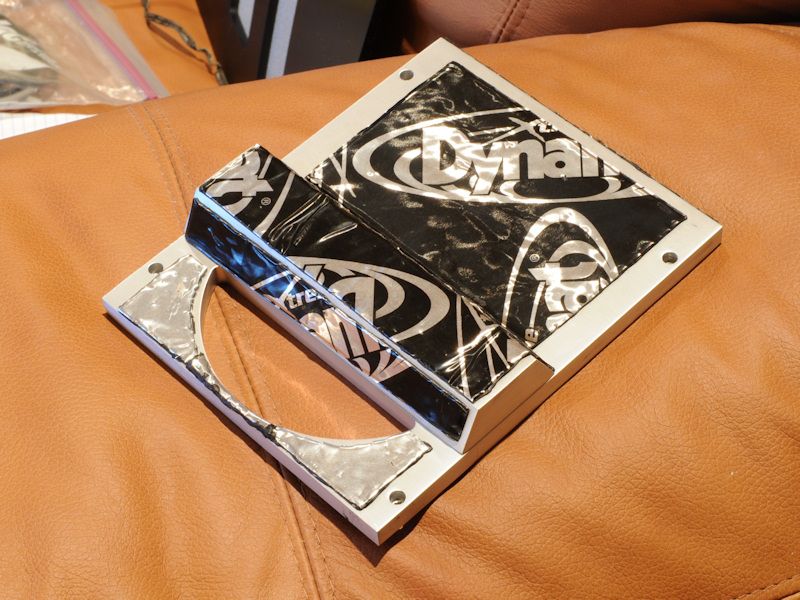
Figure 5. The transport cover draped in Dynamat.
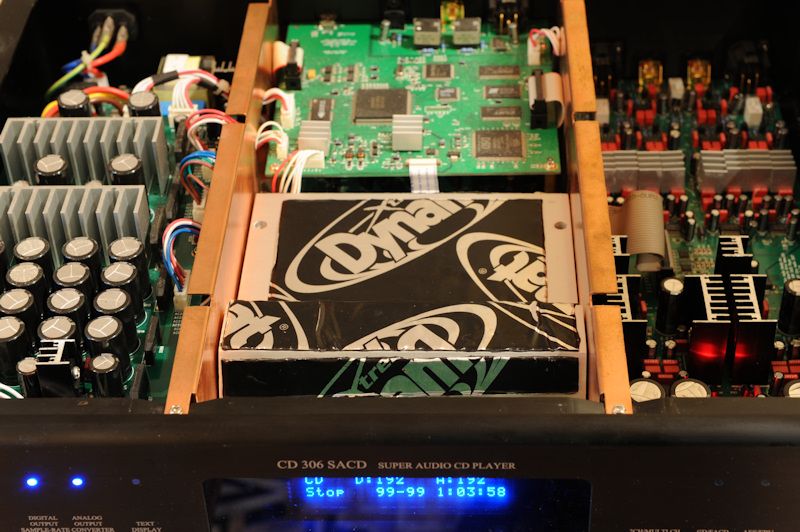
Figure 6. Dynamated transport cover installed.
I received my first bit of sonic satisfaction before the first post-installation disc was played. The disc drawer made a solid sounding "clunk" sound when it closed. Before, it closed with a metallic "clack". I would have put Dynamat under the disc tray had there been room.
Test Procedure
Measurements of a 50 Hz square wave were taken at the right channel XLR output with an oscilloscope before and after Dynamat application. A 4 foot length Signal Cable Silver Resolution XLR interconnect was inserted into CD306's the right output. The oscilloscope's probe was attached to the signal and ground pins of the interconnect with alligator clips. I would have preferred to attach the probe directly to the player's output pins, but I would have had to move the player out of its normal position to easily access the rear panel, and I did not want to do that.
Measurements were taken prior to the listening evaluation, but the results were not reviewed and analyzed until after the listening evaluation.
Test Apparatus:
1. Tektronix TDS 2013 Digital Oscilloscope.
2. Signal Cable Silver Resolution XLR interconnect, 4 foot length.
3. Autosound 2000 Test Disc #101, Track 8, 50 Hz square wave test signal.
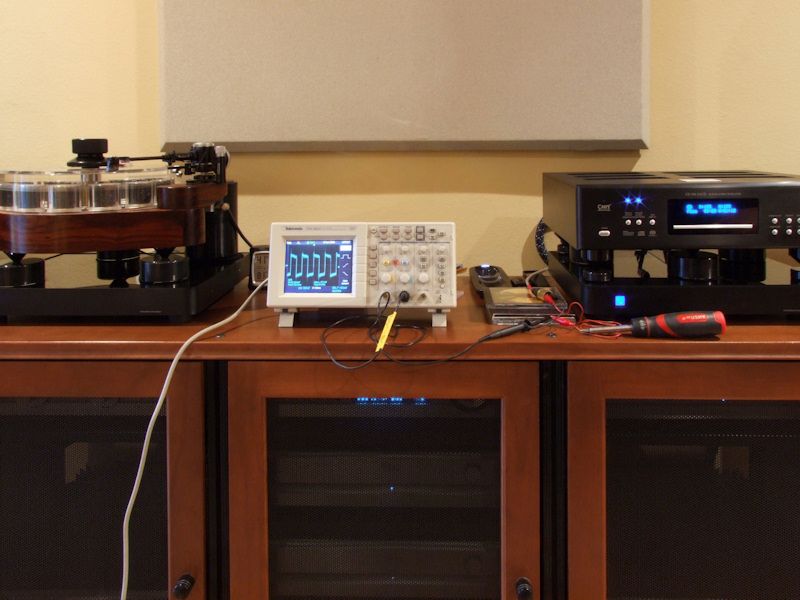
Figure 7. Test signal measurement setup.
Figures 8-15 show the pre and post Dynamat test signal measurements. The damping effect of the Dynamat resulted in an overall cleaner signal with less overshoot and 3% faster response time.
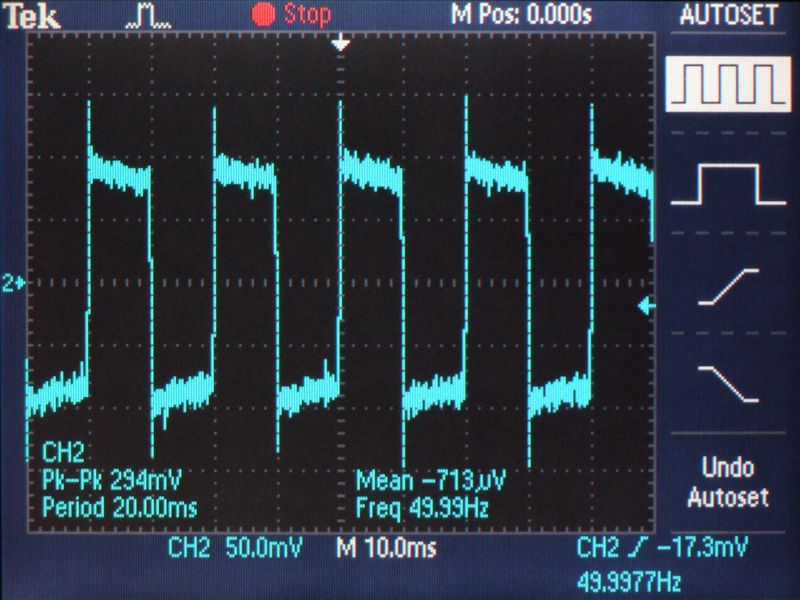
Figure 8. Square wave pulse train pre-Dynamat.
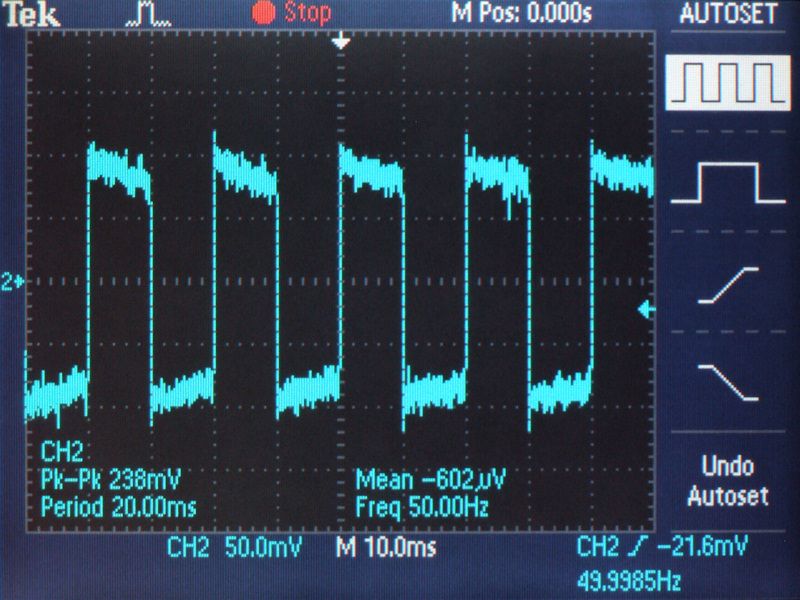
Figure 9. Square wave pulse train post-Dynamat.
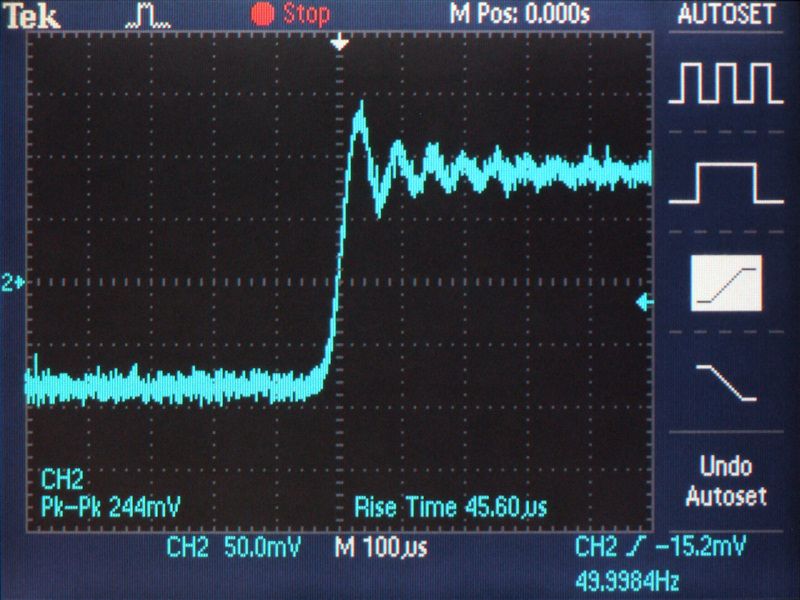
Figure 10. Square wave pulse rising edge pre-Dynamat.
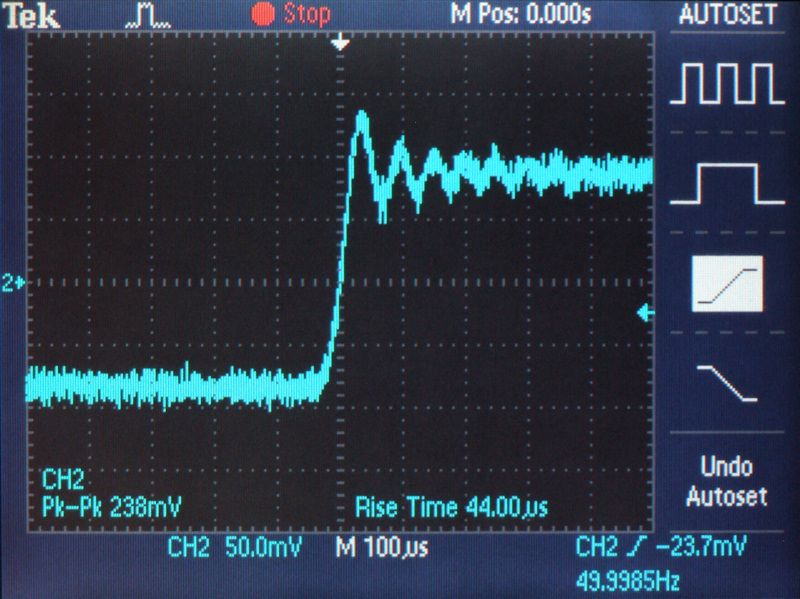
Figure 11. Square wave pulse rising edge post-Dynamat.
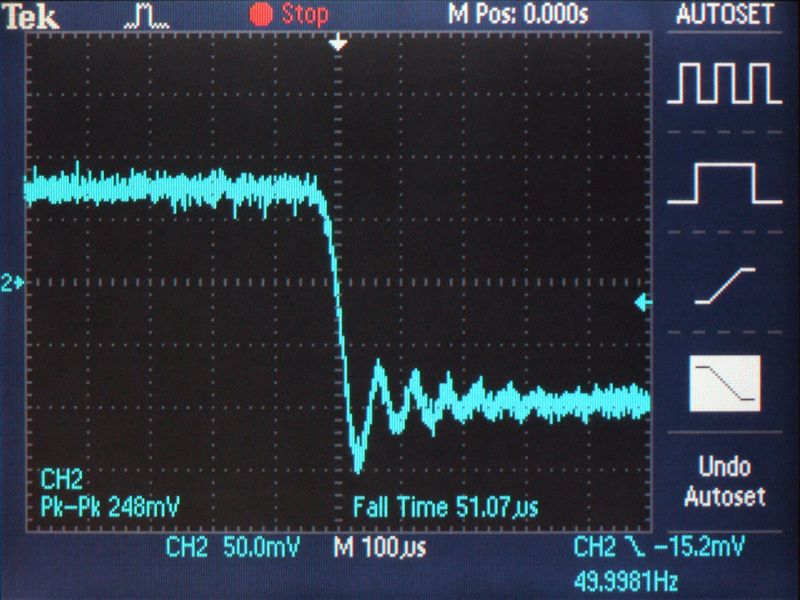
Figure 12. Square wave pulse falling edge pre-Dynamat.
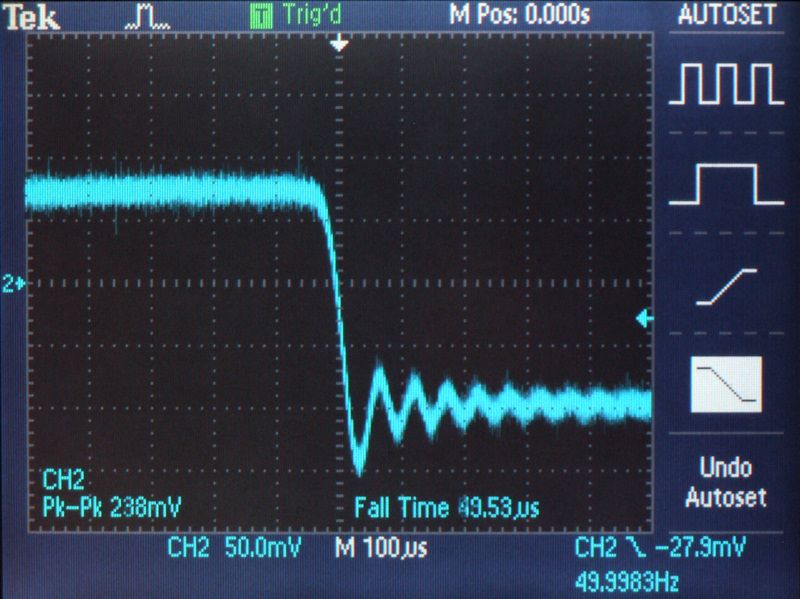
Figure 13. Square wave pulse falling edge post-Dynamat.
Listening Evaluation
Listening evaluations were done with familiar, high quality recordings. Aerial and lateral spatial maps were made of stereophonic sound images and the descriptive attributes of those sound images were documented. Those notes and maps were compared to notes and maps of the same recordings taken during previous listening sessions.
Even without comparing notes, the increase in midrange and high frequency detail was immediately apparent. I could hear more of a singer's articulations and some percussion sounds that I thought were new, turned out to be louder and more clearly defined when compared to past notes. There was a small increase in depth on some recordings, as if the drum set had been moved 1 or 2 feet back. On Dave Brubeck's "Take Five", his piano seemed to be turned toward me about 30 degrees more than previous.
There was more tactile sensation and image weight, but I was very disappointed that bass detail, bass speed and bass articulation was noticeably diminished. I did not know if this was something permanent or if it was a matter of the player needing to "re-settle" or "re-break in". The late D. J. Kasser informed me that components usually need to re-settle or break in all over again once their mechanical vibration environment is changed. I was prepared to wait a couple of days to see if the bass improved, otherwise, the Dynamat was coming off. The bass aberrations went away after 5 hours of play time and bass performance was improved over the non-Dynamat performance after 10 hours of play time.
Since I already had my Dynamat Xtreme and tools out (after applying Dynamat to my power amps), I thought it was a good time to stick a little of the old "black magic" into my Cary Audio CD 306 Professional Version SACD player in order to deal with internal vibrations caused by the transport. I had already implemented an effective regimen against external vibrations as shown in figure 1.
Cary Audio did pay due regard to vibration abatement. The chassis is a thick aluminum box with copper bar bracing and thick aluminum cone feet. A thick aluminum plate covers the transport assembly and the disc tray is a single piece of machined aluminum. All circuit boards are braced well-supported to diminish vibration. However, Cary got it all wrong with the placement of the cone feet. Rather than a foot at each corner, there should have been a foot under the transport motor, another foot under the power supply, and a third foot in the rear opposite the foot under power supply. Cary's oversight actually worked out for the best. The Black Diamond Racing carbon fiber cone/pit system is a better solution than aluminum cones and I did not have the issue of permanently attached cone housings being in the way of the optimum placement locations.

Figure 1. Cary CD 306 Pro Version SACD player resting on Black Diamond Racing Mark 4 cones and Jumbo
Pits, and a PS Audio PowerBase isolation platform with power line filtration.
Installation Procedure
Dynamat was applied to the transport cover, which is a thick 7/16" slab of aluminum, with an additional 1" thick aluminum bar over the disc spindle. The transport cover was fairly resistant to ringing, only producing a dull truncated ring when tapped. After Dynamat was applied, the transport cover produced a dull "thump" sound similar to that of a thick hardcover book when tapped with a finger.
Dynamat was also applied to the sides and rear of the plastic transport housing, the plastic crossbar which houses the spindle cap, and the sides of the copper walls on either side of the transport..

Figure 2. Tight space! The disc tray is aluminum, but the transport housing is all plastic. There was only
1/4" clearance between the sides of the transport and the copper walls. I used a tool to assist in applying
Dynamat in those narrow spaces.

Figure 3. This thingamajig, which was made from a wire clothes hanger to assist in pulling drivers from a
speaker cabinet, has proven useful in lifting off the snug-fitting covers of my X600.5 power amps and in
spreading strips of Dynamat in tight places.

Figure 4. Dynamat was applied to the opposite sides of the copper walls adjacent to the transport.

Figure 5. The transport cover draped in Dynamat.

Figure 6. Dynamated transport cover installed.
I received my first bit of sonic satisfaction before the first post-installation disc was played. The disc drawer made a solid sounding "clunk" sound when it closed. Before, it closed with a metallic "clack". I would have put Dynamat under the disc tray had there been room.
Test Procedure
Measurements of a 50 Hz square wave were taken at the right channel XLR output with an oscilloscope before and after Dynamat application. A 4 foot length Signal Cable Silver Resolution XLR interconnect was inserted into CD306's the right output. The oscilloscope's probe was attached to the signal and ground pins of the interconnect with alligator clips. I would have preferred to attach the probe directly to the player's output pins, but I would have had to move the player out of its normal position to easily access the rear panel, and I did not want to do that.
Measurements were taken prior to the listening evaluation, but the results were not reviewed and analyzed until after the listening evaluation.
Test Apparatus:
1. Tektronix TDS 2013 Digital Oscilloscope.
2. Signal Cable Silver Resolution XLR interconnect, 4 foot length.
3. Autosound 2000 Test Disc #101, Track 8, 50 Hz square wave test signal.

Figure 7. Test signal measurement setup.
Figures 8-15 show the pre and post Dynamat test signal measurements. The damping effect of the Dynamat resulted in an overall cleaner signal with less overshoot and 3% faster response time.

Figure 8. Square wave pulse train pre-Dynamat.

Figure 9. Square wave pulse train post-Dynamat.

Figure 10. Square wave pulse rising edge pre-Dynamat.

Figure 11. Square wave pulse rising edge post-Dynamat.

Figure 12. Square wave pulse falling edge pre-Dynamat.

Figure 13. Square wave pulse falling edge post-Dynamat.
Listening Evaluation
Listening evaluations were done with familiar, high quality recordings. Aerial and lateral spatial maps were made of stereophonic sound images and the descriptive attributes of those sound images were documented. Those notes and maps were compared to notes and maps of the same recordings taken during previous listening sessions.
Even without comparing notes, the increase in midrange and high frequency detail was immediately apparent. I could hear more of a singer's articulations and some percussion sounds that I thought were new, turned out to be louder and more clearly defined when compared to past notes. There was a small increase in depth on some recordings, as if the drum set had been moved 1 or 2 feet back. On Dave Brubeck's "Take Five", his piano seemed to be turned toward me about 30 degrees more than previous.
There was more tactile sensation and image weight, but I was very disappointed that bass detail, bass speed and bass articulation was noticeably diminished. I did not know if this was something permanent or if it was a matter of the player needing to "re-settle" or "re-break in". The late D. J. Kasser informed me that components usually need to re-settle or break in all over again once their mechanical vibration environment is changed. I was prepared to wait a couple of days to see if the bass improved, otherwise, the Dynamat was coming off. The bass aberrations went away after 5 hours of play time and bass performance was improved over the non-Dynamat performance after 10 hours of play time.
Proud and loyal citizen of the Digital Domain and Solid State Country!
Post edited by DarqueKnight on
Comments
-
Further Vibration Abatement
After achieving good results by treating the CD306PV's transport, I went ahead and treated all the other accessible surfaces. This included a small portion of the top panel, both side panels, portions of the rear panel and portions of the copper interior walls. Some places, like portions of the top panel, could not be treated because the Dynamat would have been in direct contact with components on the circuit board beneath. Application in other places would have blocked access to screws or made it difficult to remove circuit boards or other components.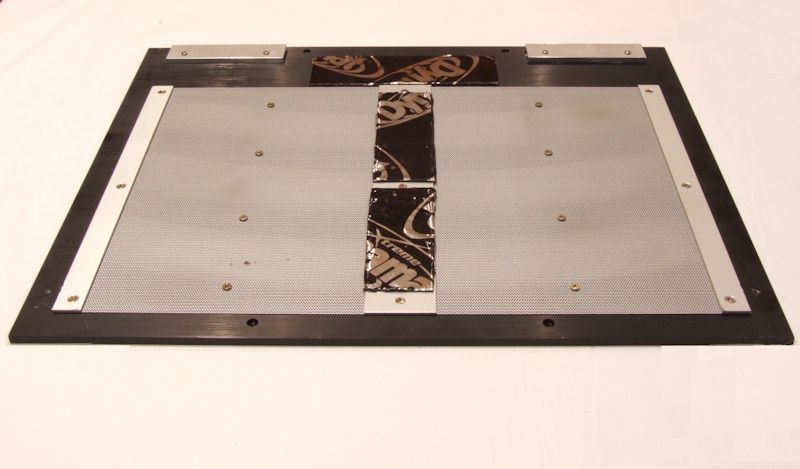
Figure 14. The top panel is a 3/16" slab of anodized aluminum with good resonance properties. The
untreated panel faintly ringed when tapped with a finger.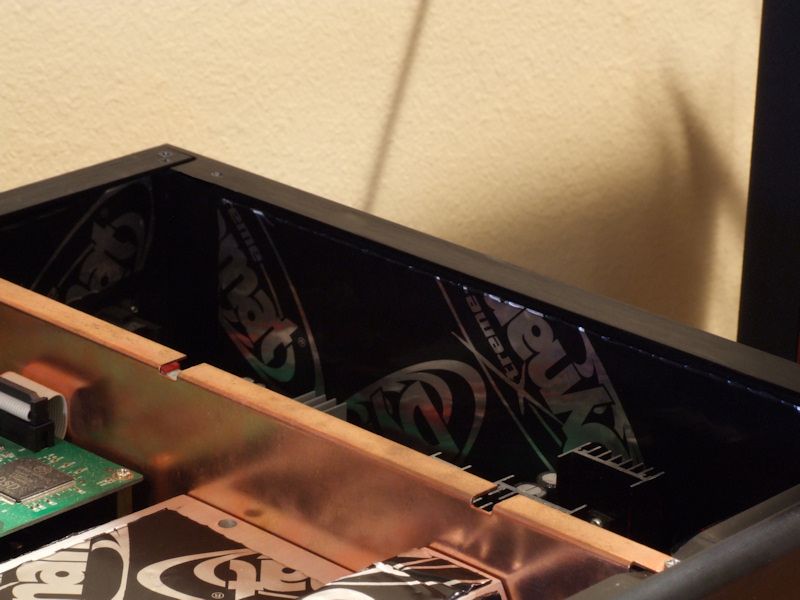
Figure 15. Each side panel was treated with a 3" x 12" Dynamat strip.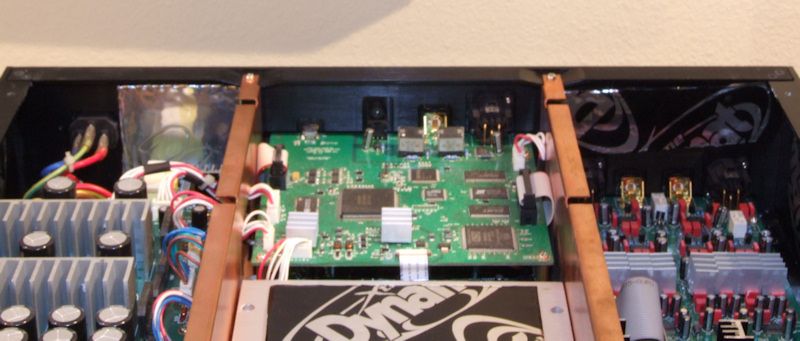
Figure 16. Dynamat was applied to the rear panel as space allowed.
Second Round Of Measurements And Listening Evaluation
Measurements showed a further reduction in distortion in the test signal waveform after additional Dynamat was installed. After the second round of Dynamat installation, I heard and felt more image weight and heard new details in some recordings. I again heard a blurring of bass transient performance, but that went away after two hours of play time.
If you save the plots of the test signal pulse train and view them in succession (figures 8, 9, and 17), the reduction in waveform distortion is quite significant as you go from no Dynamat, to Dynamat only in the transport area, to additional Dynamat.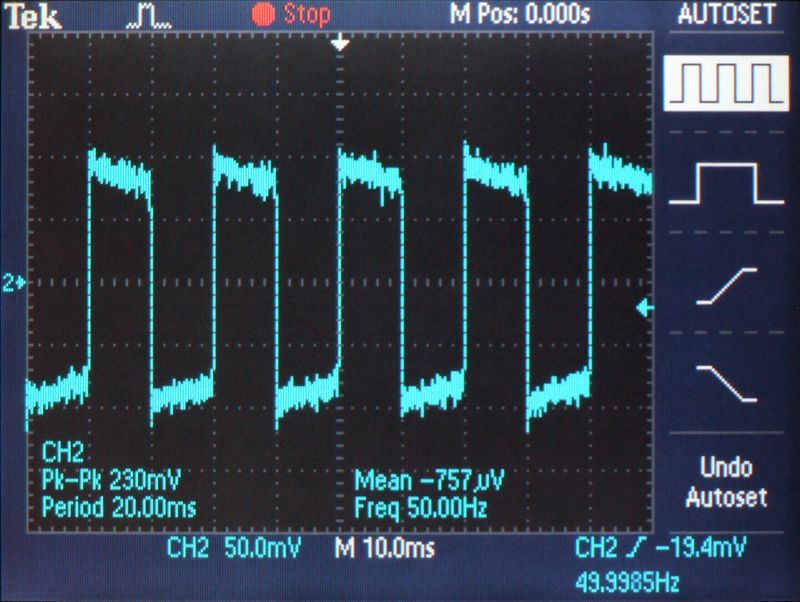
Figure 17. Square wave pulse train after additional Dynamat installation.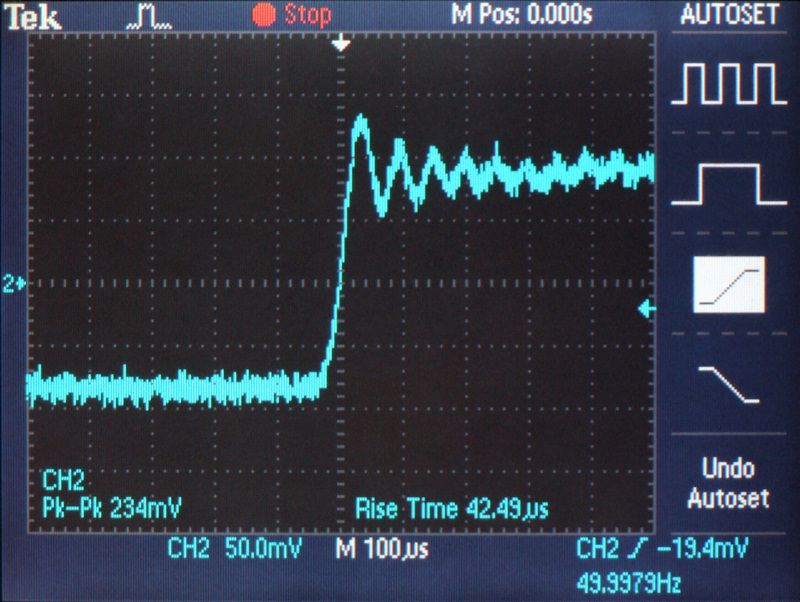
Figure 18. Square wave pulse rising edge after additional Dynamat.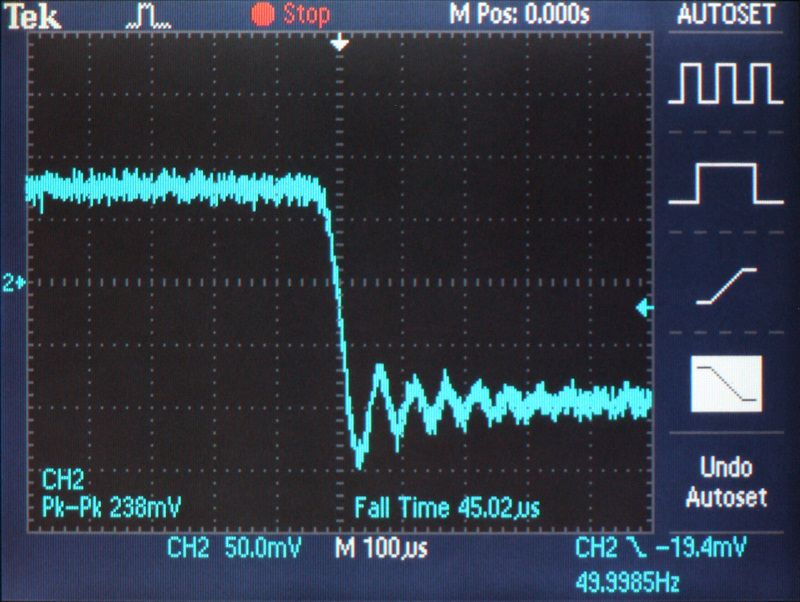
Figure 19. Square wave pulse falling edge after additional Dynamat.
Who knew that a few scrap pieces of Dynamat Xtreme would result in Such Good Sound?
All this makes me wonder what delights are in store in the future, when I will be more dedicated to audio than I am now and when I will have a really nice stereo system with real, big-deal, high-end loudspeakers and spectacular 1000 watt monoblocks.
References
The-Hard-Goodbye-Pt.-2-Isolation-Tweaks
The-Hard-Goodbye-Pt.-5-PS-Audio-PowerBase
Episode-3-The-Return-Of-Digital-Cary-Audio-CD-306-Professional-VersionProud and loyal citizen of the Digital Domain and Solid State Country! -
Ray, do you think the bass articulation and speed were demininshed in you Cary CD/SACD player? Or, were they made more precise? I ask because I noticed a tightening of the bass and making it more precise from adding dynamat xtreme in and as much from adding the Marigo TRi Mystery Feet underneath my Theta Jade Transport, the VXi Mystery Feet under my Vk-200 amp, Marigo Audio "Bear Feet" (a slightly older version of the Mystery Feet) under my VK-31 pre-amp, and some TRi Mystery Feet under my Denon DCD-3000 to what I canged into an SACD transport by adding a set of wires and an NE8FDV-Y110-B Neutrik Ethercon jack.
I will "steal" your supremely nicely coined phrase Ray: "Such good sound"


Taken from a recent Audioholics reply regarding "Club Polk" and Polk speakers:
"I'm yet to hear a Polk speaker that merits more than a sentence and 60 seconds discussion."
My response is: If you need 60 seconds to respond in one sentence, you probably should't be evaluating Polk speakers.....
"Green leaves reveal the heart spoken Khatru"- Jon Anderson
"Have A Little Faith! And Everything You'll Face, Will Jump From Out Right On Into Place! Yeah! Take A Little Time! And Everything You'll Find, Will Move From Gloom Right On Into Shine!"- Arthur Lee -
Ray, do you think the bass articulation and speed were demininshed in you Cary CD/SACD player? Or, were they made more precise? I ask because I noticed a tightening of the bass and making it more precise from adding dynamat xtreme in and as much from adding the Marigo TRi Mystery Feet underneath my Theta Jade Transport...:
Bass articulation an speed were diminished immediately after adding Dynamat, then improved over a few hours to the point where it was better than the pre-Dynamat performance.Proud and loyal citizen of the Digital Domain and Solid State Country! -
DarqueKnight wrote: »Bass articulation an speed were diminished immediately after adding Dynamat, then improved over a few hours to the point where it was better than the pre-Dynamat performance.
Thanks Ray. I noticed that after I posted my reply. Sorry for the waste of time in my question. Why do you think the bass improved after a couple hours? Does the Dynamat Xtreme need to "settle in" before improving the audio? I'm interested in your thoughts.
Taken from a recent Audioholics reply regarding "Club Polk" and Polk speakers:
"I'm yet to hear a Polk speaker that merits more than a sentence and 60 seconds discussion."
My response is: If you need 60 seconds to respond in one sentence, you probably should't be evaluating Polk speakers.....
"Green leaves reveal the heart spoken Khatru"- Jon Anderson
"Have A Little Faith! And Everything You'll Face, Will Jump From Out Right On Into Place! Yeah! Take A Little Time! And Everything You'll Find, Will Move From Gloom Right On Into Shine!"- Arthur Lee -
As usual, excellent write up.Political Correctness'.........defined
"A doctrine fostered by a delusional, illogical minority and rabidly promoted by an unscrupulous mainstream media, which holds forth the proposition that it is entirely possible to pick up a t-u-r-d by the clean end."
President of Club Polk -
Thanks Ray. I noticed that after I posted my reply. Sorry for the waste of time in my question.
No prob. It's a long read and most people only like to look at the pretty pictures. Why do you think the bass improved after a couple hours? Does the Dynamat Xtreme need to "settle in" before improving the audio?
Why do you think the bass improved after a couple hours? Does the Dynamat Xtreme need to "settle in" before improving the audio?
Yes:DarqueKnight wrote: »There was more tactile sensation and image weight, but I was very disappointed that bass detail, bass speed and bass articulation was noticeably diminished. I did not know if this was something permanent or if it was a matter of the player needing to "re-settle" or "re-break in". The late D. J. Kasser [of Black Diamond Racing isolation products] informed me that components usually need to re-settle or break in all over again once their mechanical vibration environment is changed. I was prepared to wait a couple of days to see if the bass improved, otherwise, the Dynamat was coming off. The bass aberrations went away after 5 hours of play time and bass performance was improved over the non-Dynamat performance after 10 hours of play time.Proud and loyal citizen of the Digital Domain and Solid State Country! -
DK, based on your write ups re:amp and player treatments, I'm now considering dynamatting the interior of my HK 3490 as it sits relatively close to one of my RTiA7 towers. Just wondering, is there an approved method of capacitor discharge to kind of make working inside a little safer ?
Typically a bleeder resistor is used, but you will need to contact the manufacturer to ask what type and value of resistor is required and the recommended connection point.Proud and loyal citizen of the Digital Domain and Solid State Country! -
DarqueKnight wrote: »No prob. It's a long read and most people only like to look at the pretty pictures.

LOL! Guilty on this one! I almost always read all of your reviews, but did not on this one. Obviously, I was jumping to conclusions and trying to "figure things out" by asking questions. Thanks for the response and pointing me to the answer Ray. I appreciate the time and effort you put out.
Taken from a recent Audioholics reply regarding "Club Polk" and Polk speakers:
"I'm yet to hear a Polk speaker that merits more than a sentence and 60 seconds discussion."
My response is: If you need 60 seconds to respond in one sentence, you probably should't be evaluating Polk speakers.....
"Green leaves reveal the heart spoken Khatru"- Jon Anderson
"Have A Little Faith! And Everything You'll Face, Will Jump From Out Right On Into Place! Yeah! Take A Little Time! And Everything You'll Find, Will Move From Gloom Right On Into Shine!"- Arthur Lee -
Nice write up Raife. It's really curious that the character of the bass changed for the worse and then improved. Trying to wrap my brain around that."Science is suppose to explain observations not dismiss them as impossible" - Norm on AA; 2.3TL's w/sonicaps/mills/jantzen inductors, Gimpod's boards, Lg Solen SDA inductors, RD-0198's, MW's dynamatted, Armaflex speaker gaskets, H-nuts, brass spikes, Cardas CCGR BP's, upgraded IC Cable, Black Hole Damping Sheet strips, interior of cabinets sealed with Loctite Power Grab, AI-1 interface with 1000VA A-L transformer
-
Nice write up as usual DK, you sure leave no stone unturned in doing these. BTW, that Cary 306.....a helluva player kids.HT SYSTEM-
Sony 850c 4k
Pioneer elite vhx 21
Sony 4k BRP
SVS SB-2000
Polk Sig. 20's
Polk FX500 surrounds
Cables-
Acoustic zen Satori speaker cables
Acoustic zen Matrix 2 IC's
Wireworld eclipse 7 ic's
Audio metallurgy ga-o digital cable
Kitchen
Sonos zp90
Grant Fidelity tube dac
B&k 1420
lsi 9's -
Hi there, thanks for the great review and write up. I am not sure if you are active on this forum anymore, but I recent got the 306 pro and noted a couple of issues. I haven't been able to fix them all, but well, I'll keep trying. Here they are.
First, the drawer gets stuck about 1/4 inch quite a lot when ejecting the disc or opening the tray. Not sure why. I have taken the player apart, the aluminum cover over the transport and looked, greased and didn't see any broken guides/pieces, etc. I've dampened some like you did, but didn't dampen the the aluminum housing as it really, to me didn't, seem to offer anything real mechanical coupling. Also, on that note, only three of the four screws actually were bolted to the chassis. The fourth, the one next to the front of the drawer, was like a decoy. Is that the same on yours?
Do you have issues with the drawer being stuck too? If so, were you able to fix it?
Second, the player has this annoying buzz when it is turned on. It's the only component in my system that does this. I tried a cheater plug, not dice.
Third, it doesn't read a couple of my sacd discs. Specifically the "Red Hot Ray Brown Too".
Fourth, it would skip, both on some rebook and sacd discs. These discs would play fine on my Marantz SA10.
So, any feedback would help.
Thanks -
Drawer issues are usually belt related.
Political Correctness'.........defined
"A doctrine fostered by a delusional, illogical minority and rabidly promoted by an unscrupulous mainstream media, which holds forth the proposition that it is entirely possible to pick up a t-u-r-d by the clean end."
President of Club Polk -
1. The drawer getting stuck is a known issue that results from the 306 Pro's transport's drawer mechanism wearing out and going out of alignment over time. It will have to be sent back to Cary for replacement. I did experience the same issue with my 306 Pro.
2. I never experienced the buzz issue with the Cary, but I have with other gear. The buzz was caused by a ground loop. If the ground loop in your system was not caused by the 306 pro, then using a cheater plug with it will not solve the issue. I suggest looking for ground loops in all the gear the 306 Pro is connected to.
3 and 4. Failure to read discs and skipping are known issues also. With my 306 Pro, it was due to the laser wearing out.
I had these repairs done on my 306 Pro in February 2017. The 306 Pro was sold in May 2017.
The cost of the repairs was as follows:
New laser assembly: $175
New transport: $125
Labor: $190 (2 hours @ $95/hour)
Standard bench fee: $95 (for diagnosis)
Admin fee: $30 (for their time and effort processing the repair paperwork)
Shipping: $109
Total: $724
I replaced the 306 Pro with a dCS Debussy DAC and Bryston BDP-2 digital player. I transferred all my vinyl records, SACD and CD discs to DSD files and never looked back. The only discs spinning in my stereo system are the hard drive discs in my Synology NAS.Drawer issues are usually belt related.
That's true of every other disc player I have owned. The truth about the $8,000 306 Pro is that it uses a very cheap, very flimsy plastic transport whose plastic parts wear out in a few years. I have two Yamaha CDX-1110u CD players from 1988 that also have plastic transports, but the plastic is very thick and heavy. I have only had to replace the belts on them. No wearing out of the parts and no "going out of alignment".
Replacing the 306 Pro's belt was the first thing I tried. No luck. Then I ordered a new transport and installed it myself. Still no luck. I thought maybe the new transport was defective. Cary's repair department informed me that the transport they use was not designed specifically for the 306 Pro and that it needed to be hand adjusted and aligned at the factory to ensure smooth operation. On that same call, I was also informed that the issues I was experiencing with discs not being read and with discs skipping were most likely due to the laser wearing out.
Proud and loyal citizen of the Digital Domain and Solid State Country! -
Great info 👍
-
That seems like a lot of problems that an $8,000 player shouldn't be having for many years of use.
-
Cary put a lot of time, effort, and money into the 306 Pro's DAC section, power supply, and chassis, and produced a player with world class sound quality. Unfortunately, they cheaped out on the transport.
I would have been very happy keeping the 306 Pro and just using it as a DAC (which is what some owners do), but it does not do DSD files.
It took about of year of searching before I found a DSD DAC that bested the CD 306, and I had to spend considerably more money.Proud and loyal citizen of the Digital Domain and Solid State Country! -
DarqueKnight, thank you for the comments. Yes, I love the 306 Pro but also very surprised that they used such an el cheap transport, etc. I have a Marantz SA10 and it's drawer, functionality as well as performance is stellar and stars above the Cary. I bought the Cary with these know defects hoping to fix it and mainly because of the "HDCD" playback. There are lots of great things to love about the Cary, just not the transport function!
I emailed Cary and they do not offer service on this unit any longer, which is sad. I am sure local techs can fix these issues, I think. I see new lasers/transports one bay for about $60, I wonder if those were what you used. In looking at the aluminum tray and gears, I do not see any broken plastic pieces, but perhaps it is inside gears under the tray that I can't see without removing the transport. Well, like you said, using it as a dac would be great and so forth, but it doesn't do DSD. I use my Marantz SA10 for DAC and disc duties...
Again, thank you for the feedback and insightful review and work you've done.
What did you do with all your LPs and CD/SACDs? Is it just sitting there? I can imagine how much work it was to transfer all those mediums to digital files!
Enjoy your music!
Tuan -
Yes, I love the 306 Pro but also very surprised that they used such an el cheap transport, etc.
The marketing literature for the 306/306 Pro says that they use the same transport as the venerable (and highly reliable) Sony SCD-1 SACD player. However, the SCD-1 is a top loading transport and the 306 players are drawer load transports. The following quote from a review of the original CD 306 provides some insight on how the madness began:
"While the Sony SCD-1 was a top loader, the Cary 306 SACD is a front loader via the slim machined aluminum drawer. The Sony SCD-1 drive has the reputation of being one of the better drives around, but it is so slow in reading a disc that… (and the crowd shouts out) "How slow is it?" It is so slow… that; well… the Cary ain't slow! It reads a disc in less than 5 seconds, which begs the question, "How did Cary do it?" Better software, better implementation of the drive… uh, yeah, like better Cary engineering. It is quick on its feet and quiet as a clam! Very smooth and almost glitch free. [Cary bought an SACD license from Sony (allowing them the use of the SACD logo and access to all of Sony’s SACD resources). Along with this, they bought 500 SCD-1 (with the ability to buy another 500) drives/transports (this includes the reader board, motor drive, and laser head—the whole SCD-1 transport/drive assembly as one complete unit). Cary then disassembles the SCD-1 drive/transport unit and converts it from a fixed head drive to a moving head drive so that it can be used in the front-loading 306—but, it is still the SCD-1 laser head, motor assembly (CD drive motor/spindle), and reader board. Cary then writes their own software to load and read discs. The sled assembly is all Cary. I guess in the end, it is really more of a Cary drive, though based on all Sony SCD-1 parts.]"
Link: https://positive-feedback.com/Issue23/cary_306.htmI emailed Cary and they do not offer service on this unit any longer, which is sad.
Cary seemed to experience a LOT of turnover in their tech support/repair staff. There is probably no one there now who knows how to repair a 306.I am sure local techs can fix these issues, I think. I see new lasers/transports on ebay for about $60, I wonder if those were what you used.
As noted above, the 306 uses a Sony SCD-1 laser. I doubt one of those would be found for $60.In looking at the aluminum tray and gears, I do not see any broken plastic pieces, but perhaps it is inside gears under the tray that I can't see without removing the transport.
The gears don't have to be broken to malfunction. It is more likely that the teeth wear down or deform over time and no longer engage properly.What did you do with all your LPs and CD/SACDs? Is it just sitting there? I can imagine how much work it was to transfer all those mediums to digital files!
All my disc media are in storage.
It was months of work transferring everything to digital files. Just converting the LPs was four months of evening work...and that was for a very small collection of around 250 records. A summary of the digital transfer effort can be found in the thread below. The end of the first post in that thread has links to other threads specifically about how I converted LPs, SACDs, CDs, and video media.
https://forum.polkaudio.com/discussion/183308/the-disc-less-life-no-cds-sacds-dvds-blu-rays-or-vinyl-records#latest
Proud and loyal citizen of the Digital Domain and Solid State Country! -
DarqueKnight, thank you for the comments. Yes, I love the 306 Pro but also very surprised that they used such an el cheap transport, etc. I have a Marantz SA10 and it's drawer, functionality as well as performance is stellar and stars above the Cary. I bought the Cary with these know defects hoping to fix it and mainly because of the "HDCD" playback. There are lots of great things to love about the Cary, just not the transport function!
I emailed Cary and they do not offer service on this unit any longer, which is sad. I am sure local techs can fix these issues, I think. I see new lasers/transports one bay for about $60, I wonder if those were what you used. In looking at the aluminum tray and gears, I do not see any broken plastic pieces, but perhaps it is inside gears under the tray that I can't see without removing the transport. Well, like you said, using it as a dac would be great and so forth, but it doesn't do DSD. I use my Marantz SA10 for DAC and disc duties...
Again, thank you for the feedback and insightful review and work you've done.
What did you do with all your LPs and CD/SACDs? Is it just sitting there? I can imagine how much work it was to transfer all those mediums to digital files!
Enjoy your music!
Tuan
Tuan,
When did you email Cary about servicing? I have a 306 Pro and I had mine serviced in October 2019.
Two-Channel System:
ANALOG AUDIO CHAIN:
Turntable/Cartridge: CLEARAUDIO Innovation Wood/Kuzma 4Point/Ortofon A95...
Phono Pre: ASR Basis Exclusive HV——————>
DIGITAL AUDIO CHAIN:
Server: ANTIPODES CX (Oladra Upgrade)...
DAC: CARY DMS-600—————————-———->
Disc Player: CARY CD 306 SACD PRO—————>
Pre-Amp: ====> Cary SLP-05 (Ultimate Upgrade Edition)
Amplifiers: Clayton M-300 monoblocks
~~~
Loudspeakers: MARTIN LOGAN SPIRES/Rel 212SX x2 -
Hi asindc,
I just emailed like Sept / October of this year. Here was their answer:
"Hi Tuan,
Sorry but there is not really anything you can do. The guide pins are plastic rails on the loader itself and just wear down because of friction.
Yes there are laser replacements. $175.00, but these need to be installed by a certified technician due to ESD precaution. Once these laser are removed from there packaging they are not refundable.
Not sure why it would skip other than the laser may need to be replaced. I have no idea why it would buzz."
So, I am not sure if they would even service it's they reference a "certified technician". I would think that if they offered to replace they would say, send it in and we can service it. That was never stated. But I guess I can ask specifically about it. Can't hurt right?
Thanks
-
Hi asindc,
I just emailed like Sept / October of this year. Here was their answer:
"Hi Tuan,
Sorry but there is not really anything you can do. The guide pins are plastic rails on the loader itself and just wear down because of friction.
Yes there are laser replacements. $175.00, but these need to be installed by a certified technician due to ESD precaution. Once these laser are removed from there packaging they are not refundable.
Not sure why it would skip other than the laser may need to be replaced. I have no idea why it would buzz."
So, I am not sure if they would even service it's they reference a "certified technician". I would think that if they offered to replace they would say, send it in and we can service it. That was never stated. But I guess I can ask specifically about it. Can't hurt right?
Thanks
I encourage you to ask about replacing the laser assembly. That is what I had done.
Two-Channel System:
ANALOG AUDIO CHAIN:
Turntable/Cartridge: CLEARAUDIO Innovation Wood/Kuzma 4Point/Ortofon A95...
Phono Pre: ASR Basis Exclusive HV——————>
DIGITAL AUDIO CHAIN:
Server: ANTIPODES CX (Oladra Upgrade)...
DAC: CARY DMS-600—————————-———->
Disc Player: CARY CD 306 SACD PRO—————>
Pre-Amp: ====> Cary SLP-05 (Ultimate Upgrade Edition)
Amplifiers: Clayton M-300 monoblocks
~~~
Loudspeakers: MARTIN LOGAN SPIRES/Rel 212SX x2 -
-
That's unfortunate to hear. My previous 306SACD was able to be serviced, the laser assembly was replaced a couple years ago because there was worry that they would run out of parts.
I also recently had the entire assembly replaced on my Emm labs transport.
A dying breed I'm sure.Magico M2, JL113v2x2, EMM, ARC Ref 10 Line, ARC Ref 10 Phono, VPIx2, Lyra Etna, Airtight Opus1, Boulder, AQ Wel&Wild, SRA Scuttle Rack, BlueSound+LPS, Thorens 124DD+124SPU, Sennheiser, Metaxas R2R -
Thanks Joey V for the comment. So, does the 306 now play flawlessly? No drawer issues, no skipping, etc.?





